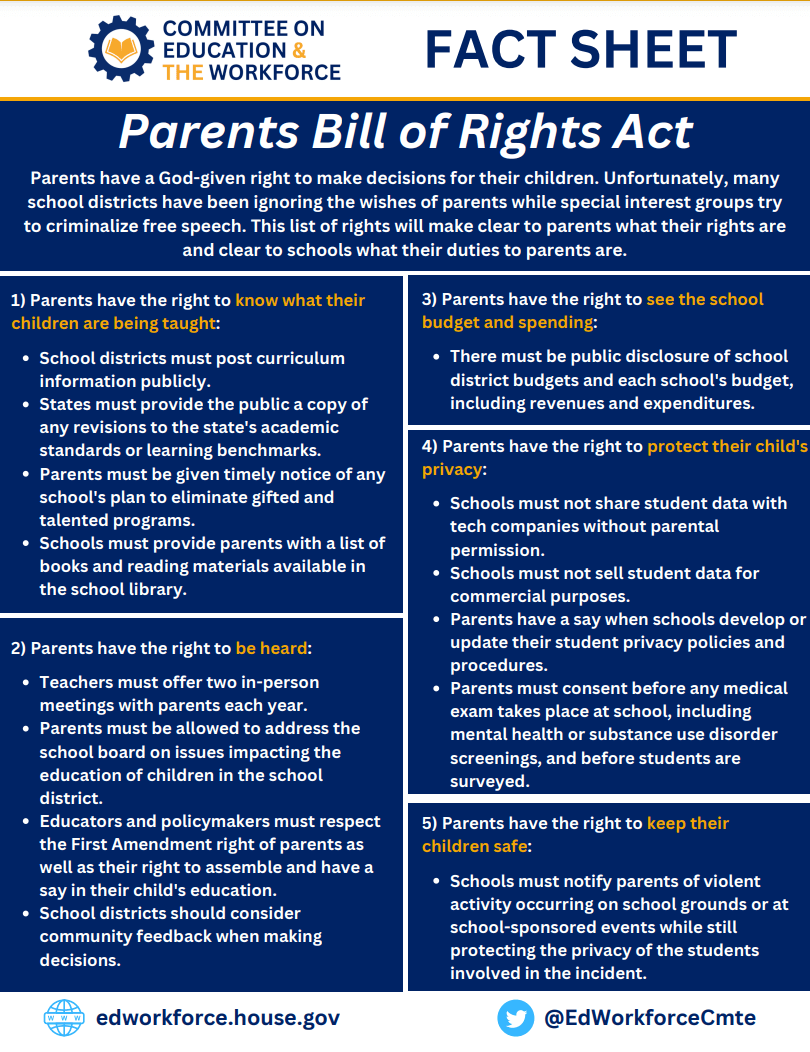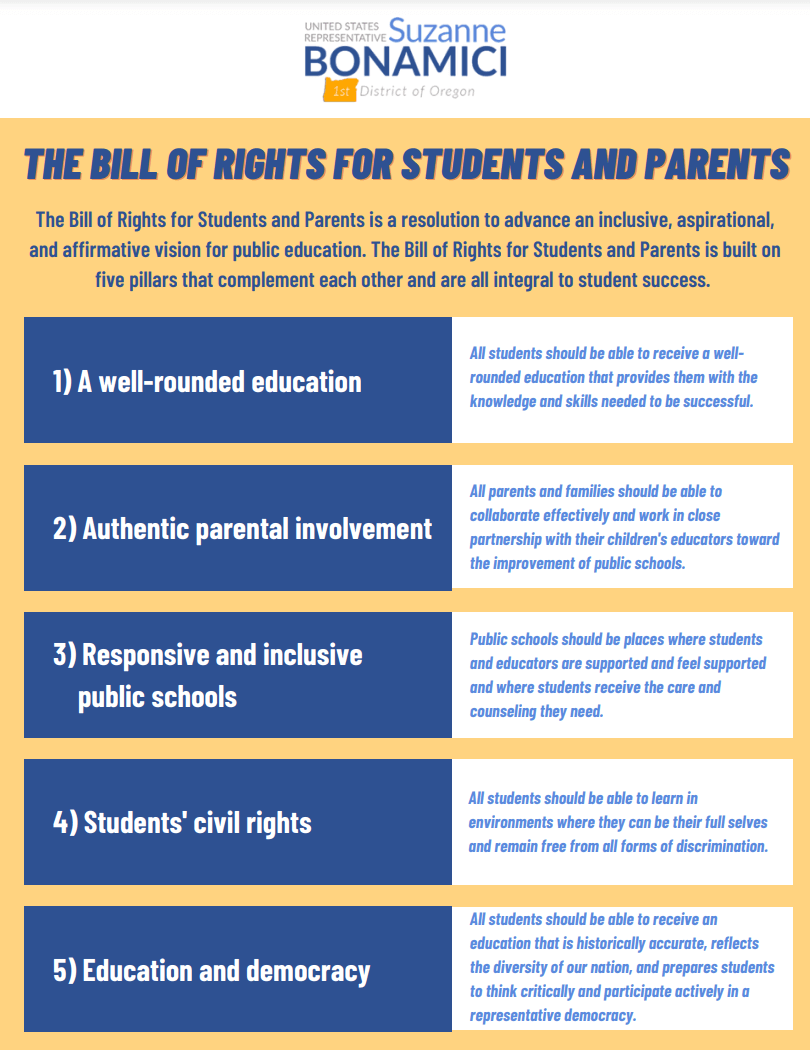What are the rights of parents?

Parent Rights take center stage
Remember when parent engagement was a sleepy subject, mostly confined to local PTA meetings?
In This Post
What rights do parents already have?
Existing state laws
Existing federal laws (ESEA and ESSA)
Existing federal laws (IDEA)
Which states are calling for additional Parent Rights?
Which states are calling for a ban on teaching about Critical Race Theory?
What is the Republican position about Federal law related to Parent Rights?
What is the Democratic position about Federal law related to Parent Rights?
Student Rights vs. Parent Rights
In some places, parent conversations have turned into high-tension shouting matches about changing the federal and state laws that govern parent rights.
At the heart of the controversy is power. Schools and libraries provide students and communities with access to materials that can challenge norms or beliefs. Should parents have the power to prevent students from seeing materials or hearing views that they object to?
Overview of existing parent rights in California education
Before we dive into the divisions, it makes sense to acknowledge the many rights parents have now. Contrary to what some people believe, parents already have a comprehensive list of rights, especially in California.
At the state policy level, parents and their advocacy groups can and do provide input on bills throughout the legislative process. For example, there has been vigorous debate in California about school vaccination policies and school choice policies.
Parents can also bring their concerns to the State Board of Education, which molds laws into specific policies that affect schools and districts. The State Board makes decisions on issues that generate lots of controversy. How should math be taught, for example? What should be included in the ethnic studies curriculum, the history/social studies frameworks, and health education?
The three lists below enumerate many of the rights parents have under California and/or federal laws. Before your eyes glaze over, please understand that these are three long lists.
…and that’s the point, actually. (Feel free to skim, because there’s a lot more to this post!)
|
Parent rights under California laws (esp. the Education Code) |
|---|
|
The right to visit the classroom, with faculty coordination and subject to exceptions such as a restraining order. (This right is also part of ESEA, the main federal education law.) |
|
The right to parent-teacher conferences and parent-principal conferences. (Also federal ESEA.) |
|
The right to volunteer time and resources. (Also ESEA.) |
|
...to be notified if their child is absent. |
|
...to get results of state tests for their student and school |
|
School choice: request enrollment in a particular school |
|
Safety: To have a school environment for their child that is safe and supportive of learning. |
|
Examine the curricular materials of the class or classes in which their child is enrolled. |
|
Be informed of student progress and who to contact if a problem arises. (Also ESEA) |
|
Have access to school records of their child |
|
Receive information about academic standards (Also ESEA) |
|
Be informed about school rules including discipline |
|
Receive information about psychological testing and deny permission |
|
Participate in a parent advisory committee, school site council, etc. |
|
The Local Control Funding Formula requires parental involvement and family engagement in setting budget priorities for school districts |
|
The California Healthy Youth Act includes parent rights to exclude their child from sex education. |
|
Receive notifications in the pupil’s home language |
|
The California Early Intervention Services Act spells out parent rights related to services for infants and toddlers with disabilities. |
|
Additional Parent Rights under Federal Laws and Every Student Succeeds Act (ESSA) |
|---|
|
Invite all parents to at least one schoolwide annual meeting that explains parent rights under federal law. |
|
Involve parents in planning, review, and improvement of programs |
|
Provide timely notice about a teacher who does not meet the applicable state certification or licensure |
|
Have a School-Parent Compact to help children achieve state standards at each school that receives federal Title I funds. |
|
Right-to-Know professional qualifications of a child’s teachers (ESSA) |
|
Right to transfer out of a school that is “persistently dangerous” |
|
Opportunities to be involved in district and school activities; advisory, decision-making, and advocacy roles; and activities to support learning at home |
|
Information describing programs for English Language Learners |
|
Explanation of how a program meets the objectives of the child’s individualized education program |
|
The Family Educational Rights and Privacy Act (FERPA) protects the privacy of student records |
|
The Protection of Pupil Rights Amendment (PPRA) gives parents the right to be informed of surveys that involve their child and the opportunity to opt out. |
|
Additional Parent Rights under Federal Law (esp IDEA) |
|---|
|
Referral: A right to refer their child for special education services. |
|
Notice: A right to notification of changes in identification, assessment or placement, in native language. |
|
Consent: Parents must provide informed, written consent before their child is assessed or provided with any special education services. |
|
Refusal: Parents may refuse to consent to an assessment or the placement of their child in special education. |
|
Nondiscriminatory assessment: Assessments for special education that are not culturally biased or discriminatory. |
|
Right to independent educational evaluation. |
|
Access to educational records |
|
Right to hearing regarding disagreements about an IEP |
|
More: Additional rights for parents under IDEA are beyond the scope of this summary. |
We probably omitted some, but the message is clear, right? Both state and federal laws already provide for many parent rights in education.
I want more rights!
Strong political divisions are fueling requests for new laws to further expand parent rights in education. Some parents want more control over curriculum, for example, especially relating to teaching about LGBTQ+ identities and issues, race, and diversity.
Many proposed changes are aligned with Republican party opposition to teaching about historic government policies that discriminated against racial, ethnic and religious minorities. Some proposals align with religious views on sex education and sexual orientation.
The map below shows at least some of the states where laws to change parent rights have been recently introduced or enacted (as of mid-March 2023). Tip: For details about a state, click it in the map, then click the text link.
Critical Race Theory
Mention Critical Race Theory in polite conversation and before you know — depending on where you live — the conversation is no longer polite.
The issue: Should teachers be free to teach history, warts and all, or should the government protect children from the discomfort of learning about the history of racism? This conversation has morphed into meaning practically anything that touches on race— with allegations of being too “woke” adding fuel to the fire.
Opposition to Critical Race Theory has become central to conservative calls for more parent rights.
The battle over Parent Rights in Congress
Two bills in Congress aim to redefine Parent Rights for the whole country, not just for individual states, districts, or schools. These bills reflect differing partisan views about parent rights.
Republican version
The Republican bill, called the Parents Bill of Rights, specifies areas of parent control in detail. A Fact Sheet about the bill declares that “parents have a God-given right to make decisions for their children.”

As a practical matter, most provisions of the Republican bill are already law in California. There are, however, some significant differences. The Republican bill includes:
- The right to a list of the books and other reading materials contained in the library of their child’s school.
- The right to information about any plans to eliminate gifted and talented programs in the child’s school.
- The right for parents’ concerns over content and pedagogy to be heard and fully considered by school professionals.
- The requirement to post curriculum on a district website.
- The right to know if a school employee or contractor acts to change a minor child’s gender markers, pronouns, or preferred name or allows a child to change the child’s sex-based accommodations, including locker rooms or bathrooms.
The bill has gathered co-sponsors only along partisan lines.
Democratic version
The Democratic Bill of Rights for Students and Parents seeks to advance a vision for public education that it describes as “inclusive, aspirational, and affirmative”.

Political Reality
The Republican and Democratic visions of a Parent Bill of Rights are politically irreconcilable. Most Republicans won’t vote for the Bill of Rights for Students and Parents. Most Democrats won’t support the Parents Bill of Rights. The likeliest outcome is that the states will continue to haggle over the rights of parents in their communities and state legislatures, with continued grandstanding and disruption in local school board meetings.
As Rebecca Winthrop of the Brookings Institution points out, this polarization is new and regrettable:
It may come as a great surprise that before the recent book bans, masking debates, and critical race theory wars, there has been a strong movement advancing parental engagement in education for several decades. Attracting considerably less media attention than today’s dueling legislative proposals, this longstanding parents’ movement has advanced quietly over the years through the consistent work of education practitioners, parent and community groups, nonprofits, and researchers.
Parent Rights vs. Student Rights
Let’s keep in mind the essential role public schools play in our democracy. Children need the freedom to learn about their society and the world beyond it.
In authoritarian countries, a core function of the education system is to suppress students’ access to competing ideas, including political views. In America’s public schools, the central priority should not be to enforce the power of parents — it should be to serve the rights and needs of children.
Thanks for reading to the end. This post was a bigger research project than most. We hope you'll share it, and we look forward to your comments!
Tags on this post
All Tags
A-G requirements Absences Accountability Accreditation Achievement gap Administrators After school Algebra API Arts Assessment At-risk students Attendance Beacon links Bilingual education Bonds Brain Brown Act Budgets Bullying Burbank Business Career Carol Dweck Categorical funds Catholic schools Certification CHAMP Change Character Education Chart Charter schools Civics Class size CMOs Collective bargaining College Common core Community schools Contest Continuous Improvement Cost of education Counselors Creativity Crossword CSBA CTA Dashboard Data Dialogue District boundaries Districts Diversity Drawing DREAM Act Dyslexia EACH Early childhood Economic growth EdPrezi EdSource EdTech Education foundations Effort Election English learners Equity ESSA Ethnic studies Ethnic studies Evaluation rubric Expanded Learning Facilities Fake News Federal Federal policy Funding Gifted Graduation rates Grit Health Help Wanted History Home schools Homeless students Homework Hours of opportunity Humanities Independence Day Indignation Infrastructure Initiatives International Jargon Khan Academy Kindergarten LCAP LCFF Leaderboard Leadership Learning Litigation Lobbyists Local control Local funding Local governance Lottery Magnet schools Map Math Media Mental Health Mindfulness Mindset Myth Myths NAEP National comparisons NCLB Nutrition Pandemic Parcel taxes Parent Engagement Parent Leader Guide Parents peanut butter Pedagogy Pensions personalized Philanthropy PISA Planning Policy Politics population Poverty Preschool Prezi Private schools Prize Project-based learning Prop 13 Prop 98 Property taxes PTA Purpose of education puzzle Quality Race Rating Schools Reading Recruiting teachers Reform Religious education Religious schools Research Retaining teachers Rigor School board School choice School Climate School Closures Science Serrano vs Priest Sex Ed Site Map Sleep Social-emotional learning Song Special ed Spending SPSA Standards Strike STRS Student motivation Student voice Success Suicide Summer Superintendent Suspensions Talent Teacher pay Teacher shortage Teachers Technology Technology in education Template Test scores Tests Time in school Time on task Trump Undocumented Unions Universal education Vaccination Values Vaping Video Volunteering Volunteers Vote Vouchers Winners Year in ReviewSharing is caring!
Password Reset
Search all lesson and blog content here.
Login with Email
We will send your Login Link to your email
address. Click on the link and you will be
logged into Ed100. No more passwords to
remember!














Questions & Comments
To comment or reply, please sign in .
Carol Kocivar August 23, 2023 at 3:43 pm
https://oag.ca.gov/news/press-releases/attorney-general-bonta-temecula-valley-unified-school-district’s-forced-outing?print=true
Carol Kocivar August 23, 2023 at 3:42 pm
https://oag.ca.gov/news/press-releases/attorney-general-bonta-temecula-valley-unified-school-district’s-forced-outing?print=true
jim hoch July 3, 2023 at 9:31 am